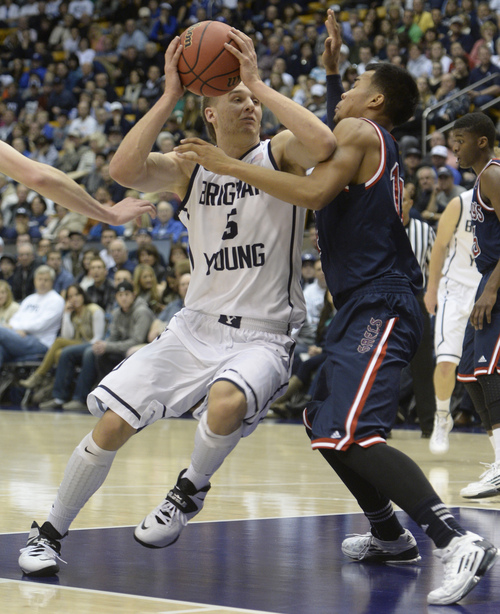This is an archived article that was published on sltrib.com in 2014, and information in the article may be outdated. It is provided only for personal research purposes and may not be reprinted.
Other than personally insulting Kyle Collinsworth, the NCAA basketball committee treated BYU extremely well.
The Cougars received Selection Sunday's biggest gift, drawing a No. 10 seed — and, most significantly, not having to play a first-round game Tuesday. In the wake of Collinsworth's season-ending knee injury, the committee would have been justified in sending BYU to Dayton, Ohio, and making the Cougars prove their worth without the sophomore guard who might be their most valuable player.
BYU caught a huge break, even if Oregon is one of the country's hottest teams. The Cougars deserved to be in the field, but being ranked among the top 40 teams is more than they ever could have wanted.
The other natural conclusion is that Utah is very close to being an NCAA Tournament program. With a stronger nonconference schedule — and presumably, some success — and maybe one more league victory, Utah certainly could have joined the six Pac-12 teams in the field or displaced one of them. The fact the Utes went 2-2 (losing by a total of three points on the road) against No. 10 seeds BYU, Arizona State and Stanford should be encouraging to them, not maddening.
The Cougars were rewarded for playing a very respectable schedule, and they also should be glad they beat San Francisco in overtime in the West Coast Conference tournament semifinals. Because of that victory, it is apparent that nothing about the Cougars' performance in the championship game against Gonzaga hurt them.
Collinsworth's injury, as disappointing as it is for him and as difficult as his rehabilitation will be, obviously was not held against BYU.
So the Cougars should feel thankful for whatever role Utah State athletic director Scott Barnes, Big Sky Conference commissioner Doug Fullerton and outgoing WCC commissioner Jamie Zininovich, who's moving to the Pac-12, had in supporting them — or not arguing against them.
Ron Wellman, the chair, said recently, "It is up to the individual committee member as to how much weight they want to put on [an] injury."
Or none, evidently, in Collinsworth's case.
The Cougars did play reasonably well in the last 13 minutes of that 12-point defeat after Collinsworth exited, but that's a small sample size and the reality is the outcome was determined at that point. It is ridiculous to believe that BYU is anywhere near as good without Collinsworth, and simply astounding that the committee would rank the Cougars, in their current state, in a class with Stanford, ASU and St. Joseph's, the other No. 10 seeds.
Having said that, I've always believed NCAA Tournament seeding is highly overrated. Anything between Nos. 6 and 11 creates about the same opportunity to advance to the Sweet 16. But when it comes to determining which teams have to play in first-round games, the distinction becomes more critical.
BYU was elevated above Iowa, Tennessee, North Carolina State and Xavier, the teams convening this week in Dayton.
Now, the Cougars have to justify the committee's belief. They haven't beaten a higher-seeded team in the NCAA Tournament since the Shawn Bradley season of 1991, and they're facing an Oregon team that beat them in overtime in December at Eugene — where Collinsworth posted 15 points and eight assists to support Tyler Haws' 32-point effort. There's much more pressure on Haws, Matt Carlino and the rest in Collinsworth's absence.
BYU's No. 10 seed is a tribute to the program and an endorsement of quality scheduling. It sure seems better than the Cougars deserved, but they're the ones who will prove the committee wrong or right when they take the court Thursday in Milwaukee.
Twitter: @tribkurt



